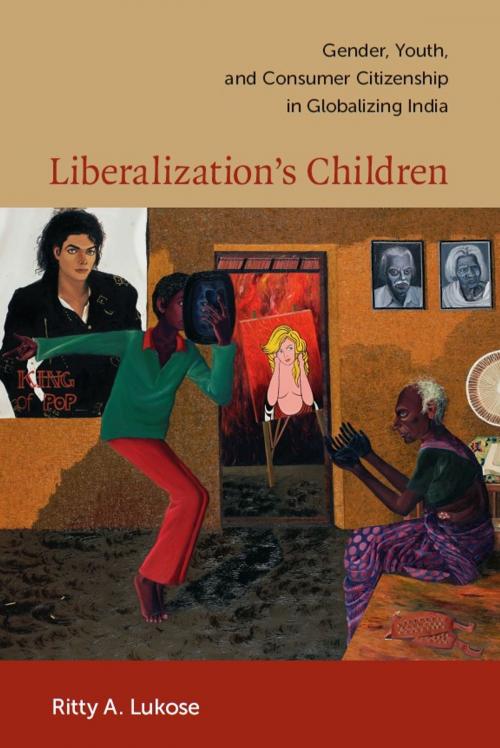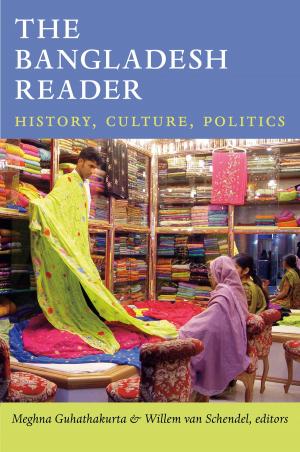Liberalization's Children
Gender, Youth, and Consumer Citizenship in Globalizing India
Nonfiction, History, Asian, India, Social & Cultural Studies, Social Science, Anthropology| Author: | Ritty A. Lukose | ISBN: | 9780822391241 |
| Publisher: | Duke University Press | Publication: | November 13, 2009 |
| Imprint: | Duke University Press Books | Language: | English |
| Author: | Ritty A. Lukose |
| ISBN: | 9780822391241 |
| Publisher: | Duke University Press |
| Publication: | November 13, 2009 |
| Imprint: | Duke University Press Books |
| Language: | English |
Liberalization’s Children explores how youth and gender have become crucial sites for a contested cultural politics of globalization in India. Popular discourses draw a contrast between “midnight’s children,” who were rooted in post-independence Nehruvian developmentalism, and “liberalization’s children,” who are global in outlook and unapologetically consumerist. Moral panics about beauty pageants and the celebration of St. Valentine’s Day reflect ambivalence about the impact of an expanding commodity culture, especially on young women. By simply highlighting the triumph of consumerism, such discourses obscure more than they reveal. Through a careful analysis of “consumer citizenship,” Ritty A. Lukose argues that the breakdown of the Nehruvian vision connects with ongoing struggles over the meanings of public life and the cultural politics of belonging. Those struggles play out in the ascendancy of Hindu nationalism; reconfigurations of youthful, middle-class femininity; attempts by the middle class to alter understandings of citizenship; and assertions of new forms of masculinity by members of lower castes.
Moving beyond elite figurations of globalizing Indian youth, Lukose draws on ethnographic research to examine how non-elite college students in the southern state of Kerala mediate region, nation, and globe. Kerala sits at the crossroads of development and globalization. Held up as a model of left-inspired development, it has also been transformed through an extensive and largely non-elite transnational circulation of labor, money, and commodities to the Persian Gulf and elsewhere. Focusing on fashion, romance, student politics, and education, Lukose carefully tracks how gender, caste, and class, as well as colonial and postcolonial legacies of culture and power, affect how students navigate their roles as citizens and consumers. She explores how mass-mediation and an expanding commodity culture have differentially incorporated young people into the structures and aspirational logics of globalization.
Liberalization’s Children explores how youth and gender have become crucial sites for a contested cultural politics of globalization in India. Popular discourses draw a contrast between “midnight’s children,” who were rooted in post-independence Nehruvian developmentalism, and “liberalization’s children,” who are global in outlook and unapologetically consumerist. Moral panics about beauty pageants and the celebration of St. Valentine’s Day reflect ambivalence about the impact of an expanding commodity culture, especially on young women. By simply highlighting the triumph of consumerism, such discourses obscure more than they reveal. Through a careful analysis of “consumer citizenship,” Ritty A. Lukose argues that the breakdown of the Nehruvian vision connects with ongoing struggles over the meanings of public life and the cultural politics of belonging. Those struggles play out in the ascendancy of Hindu nationalism; reconfigurations of youthful, middle-class femininity; attempts by the middle class to alter understandings of citizenship; and assertions of new forms of masculinity by members of lower castes.
Moving beyond elite figurations of globalizing Indian youth, Lukose draws on ethnographic research to examine how non-elite college students in the southern state of Kerala mediate region, nation, and globe. Kerala sits at the crossroads of development and globalization. Held up as a model of left-inspired development, it has also been transformed through an extensive and largely non-elite transnational circulation of labor, money, and commodities to the Persian Gulf and elsewhere. Focusing on fashion, romance, student politics, and education, Lukose carefully tracks how gender, caste, and class, as well as colonial and postcolonial legacies of culture and power, affect how students navigate their roles as citizens and consumers. She explores how mass-mediation and an expanding commodity culture have differentially incorporated young people into the structures and aspirational logics of globalization.















